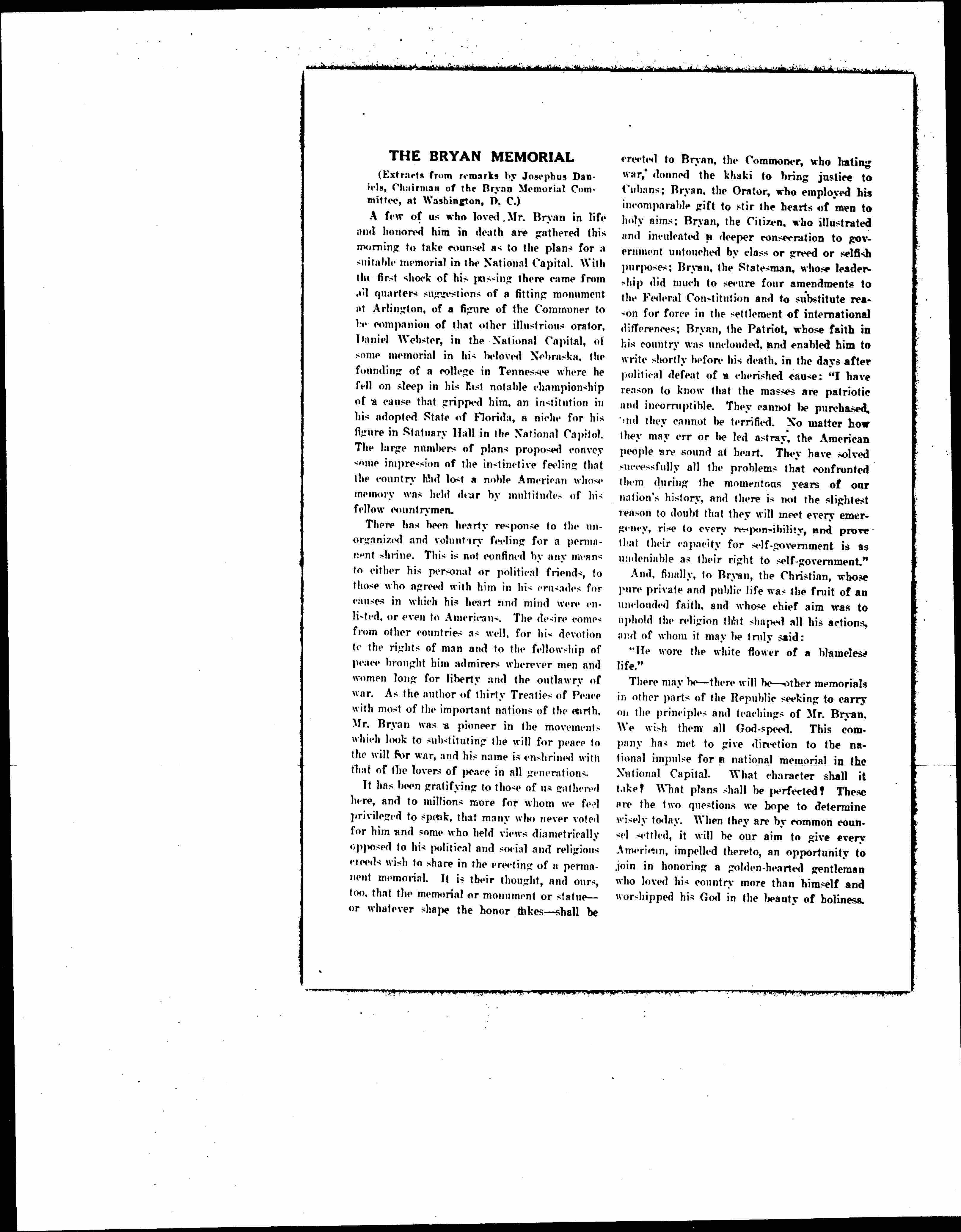THE BRYAN MEMORIAL
(Extracts from remarks by Josephus Daniels, Chairman of the Bryan Memorial Committee, at Washington, D.C.)
A few of us who loved Mr. Bryan in life and honored him in death are gathered this morning to take counsel as to the plans for a suitable memorial in the National Capital. With the first shock of his passing there came from all quarters suggestions of a fitting monument at Arlington, of a figure of the Commoner to be companion of that other illustrious orator, Daniel Webster, in the National Capital, of some memorial in his beloved Nebraska, the founding of a college in Tennessee where he fell on sleep on his last notable championship of a cause that gripped him, an institution in his adopted State of Florida, a niche for his figure in Statuary Hall in the National Capitol. The large numbers of plans proposed convey some impression of the instinctive feeling that the country had lost a noble American whose memory was held dear by multitudes of his fellow countrymen.
There has been hearty response to the unorganized and voluntary feeling for a permanent shine. This is not confined by any means to either his personal or political friends, to those who agreed with him in his crusades for causes in which his heart and mind were enlisted, or even to Americans. The desire comes from other countries as well, for his devotion to the rights of man and to the fellowship of peace brought him admirers wherever men and women long for liberty and the outlawry of war. As the author of thirty Treaties of Peace with most of the important nations of the earth, Mr. Bryan was a pioneer in the movements which look to substituting the will for peace to the will for war, and his name is enshrined with that of the lovers of peace in all generations.
It has been gratifying to those of us gathered here, and to millions more for whom we feel privileged to speak, that many who never voted for him and some who held views diametrically opposed to his political and social and religious creeds wish to share in the erecting of a permanent memorial. It is their thought, and ours, too, that the memorial or monument or statue -- or whatever shape the honor takes -- shall be erected to Bryan, the Commoner, who hating war, donned the khaki to bring justice to Cubans; Bryan, the Orator, who employed his incomparable gift to stir the hearts of men to holy aims; Bryan, the Citizen, who illustrated and inculcated a deeper consecration to government untouched by class or greed or selfish purposes; Bryan, the Statesman, whose leadership did much to secure four amendments to the Federal Constitution and to substitute reason for force in the settlement of international differences; Bryan, the Patriot, whose faith in his country was unclouded, and enabled him to write shortly before his death, in the days after political defeat of a cherished cause: "I have reason to know that the masses are patriotic and incorruptible. They cannot be purchased, and they cannot be terrified. No matter how they may err or be led astray, the American people are sound at heart. They have solved successfully all the problems that confronted them during the momentous years of our nation's history, and there is not the slightest reason to doubt that they will meet every emergency, rise to every responsibility and prove that their capacity for self-government is as undeniable as their right to self-government."
And, finally, to Bryan, the Christian, whose pure private and public life was the fruit of an unclouded faith, and whose chief aim was to uphold the religion that shaped all his actions, and of whom it may be truly said:
"He wore the white flower of a blameless life."
There may be -- there will be -- other memorials in other parts of the Republic seeking to carry on the principles and teachings of Mr. Bryan. We wish them all God-speed. This company has met to give direction to the national impulse for a national memorial in the National Capital. What character shall it take? What plans shall be perfected? These are the two questions we hope to determine wisely today. When they are by common counsel settled, it will be our aim to give every American, impelled thereto, an opportunity to join in honoring a golden-hearted gentleman who loved his country more than himself and worshipped his God in the beauty of holiness.







Comments